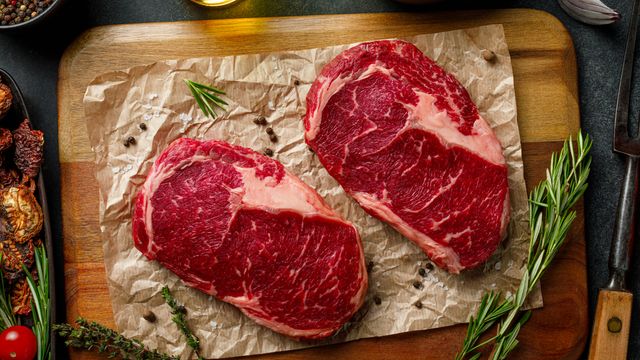Eating moderate amounts of lean beef as part of a Mediterranean diet does not increase an emerging risk factor for cardiovascular disease, according to a new study by an interdisciplinary research team at Penn State. The researchers examined indicators of heart health and gut microbiome diversity among relatively young and healthy participants who ate four different diets, including varying amounts and types of beef, for four weeks.
In the study, recently published in Journal of the American Heart Association, the researchers found that eating a Mediterranean diet with either .5 or 2.5 ounces of lean beef each day did not increase blood levels of trimethylamine N-oxide (TMAO), an emerging indicator of risk for cardiovascular disease. This was in comparison to an average American diet with 2.5 ounces of regular beef each day and a third Mediterranean diet that included 5.5 ounces of lean beef each day. TMAO, a byproduct of metabolism, can be produced when people consume animal products including beef.
Can lean beef be part of a healthy diet?
When participants ate .5 or 2.5 ounces of lean beef as part of a Mediterranean diet, they had lower blood levels of TMAO than when they ate the American diet, according to the results of the study. When participants ate the American diet with 2.5 ounces of non-lean beef daily or the Mediterranean diet with 5.5 ounces of lean beef daily, their TMAO levels were not different. These findings suggest dietary quality was more important than the amount of beef eaten, the researchers said.
“We chose 2.5 ounces of lean beef because that approximates the amount of beef that the average American consumes each day,” said Zachary DiMattia, doctoral candidate in nutritional sciences and lead author of this study. “This study suggests that, in the context of a healthy dietary pattern, people may be able to include similar amounts of lean beef without increasing their TMAO levels. If people eat reasonable portions of lean, unprocessed beef as part of a Mediterranean-style diet, we would not expect this specific marker of cardiovascular disease risk to rise.”
In addition to TMAO levels, the researchers examined how the different diets affected the diversity of participants’ gut microbiomes. Results indicated that all three Mediterranean diets increased gut microbiome diversity compared to the American diet.
The researchers said that further research is needed to understand the role the gut microbiome plays in the relationship between diet and TMAO levels. They agreed, however, that this study has implications for individuals who want to eat a healthy diet.
“Lean, moderately sized, unprocessed cuts of beef can be included as part of a healthy diet when people are consuming plenty of fruits, vegetables and healthy fats like olive oil,” DiMattia said.
More dietary impacts of lean beef
This study focused on TMAO levels, but Petersen’s laboratory group previously explored other health effects of adding lean beef to a Mediterranean diet.
In a study from earlier this year using the same data, the researchers examined how beef consumption affected the blood vessel health. The researchers found that a Mediterranean diet with lean beef resulted in lower blood pressure than when participants consumed an American diet.
Additionally, doctoral student Fatemeh Jafari led a review of previous studies that examined whether red meat consumption raised TMAO levels. The literature review highlighted the complicated nature of TMAO, Petersen said. Just under half of the studies found that red meat increased TMAO, while the rest showed no increase in TMAO associated with beef consumption.
Healthy eating is essential
The most important way to reduce risk, according to the researchers, is to establish healthy eating habits. They said that by consuming more vegetables, fruits and whole grains and reducing saturated fats, people can reduce their risk of heart disease. They also cautioned against taking these results out of context.
“This evidence does not mean you can necessarily eat a week’s worth of beef — for example, a single, 17.5-ounce steak — at one time and see the same results,” Petersen said. “Additionally, this recommendation does not extend to non-lean beef or processed meats like sausage or salami. Finally, these studies were conducted in relatively young, healthy individuals, so further research is needed in older people or anyone with elevated heart disease risk.”
This research was funded by the National Cattlemen’s Beef Association — a contractor to the Beef Checkoff — and Penn State.
Reference: DiMattia ZS, Zhao J, Hao F, et al. Effect of varying quantities of lean beef as part of a mediterranean‐style dietary pattern on gut microbiota and plasma, fecal, and urinary metabolites: a randomized crossover controlled feeding trial. J Am Heart Assoc. 2025;14(19):e041063. doi: 10.1161/JAHA.125.041063
This article has been republished from the following materials. Note: material may have been edited for length and content. For further information, please contact the cited source. Our press release publishing policy can be accessed here.


Dining and Cooking